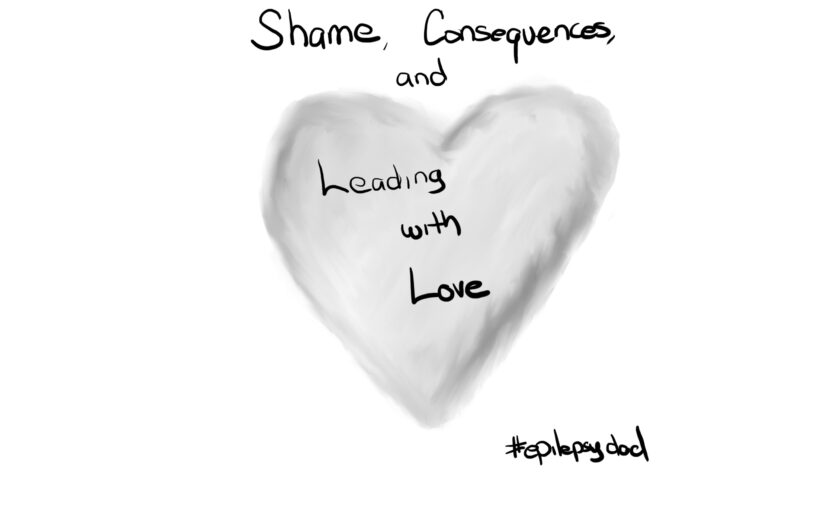“Come with me,” the security guard said.
I was ten years old.
My friend and I had ridden our bikes to a department store a few miles from my house and walked in with a brown paper bag. We headed to the toy aisle and filled our bag with Transformers and other loot, unaware that the security cameras were tracking us the whole time.
It was just as I stepped onto the pressure pad to open the automatic door that our heist was thwarted, and we were escorted back into the store, up a stairwell, and into the security office.
The security guard, an off-duty cop, rewound the security tapes and showed us his view of our activities. I watched myself from multiple angles walk shelf to shelf, pick an item, and place it in the bag. It was terrifying and embarrassing.
The guard asked us for our information and, when he heard my last name, he paused. “Wait, ” he said. “Is your dad a cop?”
My heart stopped. Every muscle in my body froze, but I managed to eke out a soft “Yes, sir.”
My captor let out a hearty laugh. “Oh, he’s going to love this,” he said, as he picked up the phone to call the police.
My friend and I were taken to the police station in the back of a police car, our bikes tucked away in the trunk. I thought about what my father would say. I thought about having to tell my mother and my stepfather. I thought about going to jail. It was and still is the longest car ride of my life.
At the station, my friend and I were separated into different interrogation rooms. I’m not sure if it was intentional, but the lighting allowed me to see the silhouette of my father on the other side of the one-way mirror. The officer in the room with me asked me questions and created a very Scared Straight experience that had its intended effect.
My father didn’t say much to me as he drove me home. I remember him telling me to have my mother call him as I stepped out of the car, and I walked up the stairs to face the consequences. Except no one was home, and I had to wait an agonizingly long time, staring out the front window, until I saw her car pull into the driveway.
Immediately, every emotion spilled out of me, and when the door from the garage opened, so did a stream of words explaining what had happened.
At the time, the consequences were predictable, if exaggerated. I couldn’t hang out with my friend again. I was grounded and lost some privileges for an unspecified amount of time. But the worst consequences were the feelings of guilt, shame, and fear that permeated every cell in my body.
I wasn’t told that I wasn’t a bad person, or that people make mistakes. I wasn’t made to feel like my actions wouldn’t define how I felt about myself for the rest of my life. I wasn’t comforted, and my feelings weren’t acknowledged.
Instead, those feelings of guilt, shame, and fear were amplified. My parents were mad and disappointed. It was one of the worst things that I could do to them. Their feelings were the only ones that mattered, and I was left to hold and figure out mine. I felt very alone.
At ten years old, figuring out my emotions by myself wasn’t possible, and so I carried that guilt, shame, and fear for the rest of my life. To this day, I’ll sometimes swing a bag of purchases through the metal detector ahead of me so that, if it does alert, everyone will know it was the bag and not me.
I think about that experience when my son makes a bad choice. I try to find that line between consequences, learning, and growth, without internalizing a destructive self-image filled with guilt and shame. Most days, it seems impossible, even without considering his mental and emotional challenges. And I can’t help but see myself at his age when I look at him, and that fear of doing it wrong and causing damage to him makes me feel unsure and indecisive.
But seeing him that way also makes me think about what my younger self needed in those moments when I was teetering on the edge of emotional collapse. What did I need? What do I wish my parents had done? Can I do that for my son now?
Often, it comes down to seeing him and asking more questions instead of projecting more statements that make the situation only about me and my feelings. It involves understanding that each of these moments has the potential to help him learn and make better decisions in the future, or shame him into destroying his sense of worthiness and self-compassion. Simply, it involves leading with love.
Remembering that can be difficult in those big, emotionally charged moments, especially considering how they played out for me. But I keep trying. I try to quiet the echoes of my own childhood long enough to truly see my son—not just his behavior, but his needs, his struggles, his heart. And in those moments, when I push past fear and into empathy, I find the thing I needed most when I was ten.
Not punishment. Not shame.
Just someone who was willing to stay beside me in the mess.
Someone who believed I was still good.
Someone who was leading with love.
